| DISC 2
The second disc opens with another introduction from Leonard Maltin (1:30). Maltin states that the sheer volume of Donald Duck shorts created in the '30s and '40s underlines how popular he was. Donald became the Disney studio's number one entity, surpassing Mickey Mouse and blazing his own trail with the Silly Symphonies line of shorts fading. Maltin also mentions a few people at the Disney studio who contributed to Donald's personality and movement. It ends with a tease of things to come in Donald's career, and undoubtedly, a future Treasure, with Donald's career changing in the 1940s.
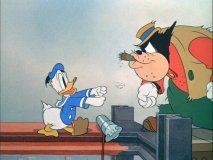 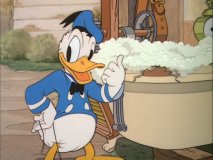 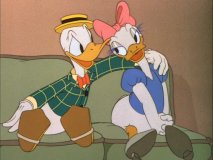
THE SHORTS
The Riveter (1940) (7:35)
Donald is walking along and singing "Heigh Ho" when he sees a sign: "Riveter Wanted." He inquires about the job, and Pete, after laughing him off, hires the duck. Donald suddenly finds himself at the very top of a construction site, clinging for life on a high beam. Wacky antics between the cigar-smoking boss and the clumsy duck ensue.
Donald's Dog Laundry (1940) (8:14)
Donald builds a modern dog washer, but when he tries to get Pluto to use it, the dog will have none of it. Donald's efforts to persuade Pluto with a bone on a string and with a kitten puppet are both feeble. Donald's the only one who winds up getting a bath.
Billposters (1940) (7:36)
Donald and Goofy reunite, and this time they're putting up advertisement posters. A windmill proves to be an obstacle for Goofy, while a hungry goat quickly undoes Donald's work. Both workers soon find themselves in sticky situations.
Mr. Duck Steps Out (1940) (8:10)
Donald gets ready to spend time with Daisy, but his nephews get in the way. He gives them money to get ice cream, but they're right back. When Donald and Daisy try to dance, they keep cutting in. Things get wackier when the triplets turn Donald into a dancing popcorn machine!
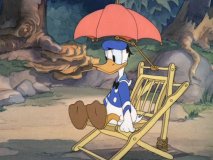 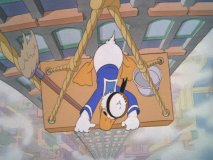 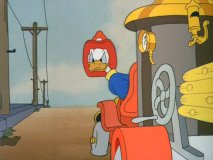
Put-Put Troubles (1940) (7:29)
Maltin introduces this short with a brief message on cultural gags. While Pluto untangles himself from a coil, Donald duels with a boat engine. The introduction seems a bit oversensitive for such quick and innocuous sight gags, the highlight of an otherwise uninspired short.
Donald's Vacation (1940) (8:14)
After a Maltin introduction that nearly matches the last one verbatim. Agitation seems to be the theme of many things for Donald, and his vacation is no different. Waterfalls, folding chairs, fruit-rolling chipmunks and a big brown bear all create discord for the duck.
Window Cleaners (1940) (8:23)
This entertaining short has Donald cleaning the windows of a high-rise building. He has fun with the job, and when he doesn't, the audience has fun with the short. We see Donald try to communicate all the way down to ground-level Pluto and bout with a bumblebee.
Fire Chief (1940) (8:21)
Donald attempts to run a quality fire department with his crew: his three nephews. As you can surely imagine, everything that can go wrong does. Here, the gags are just a little bit sharper, elevating this short above other Donald cartoons.
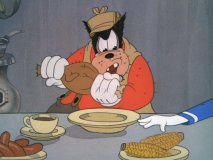  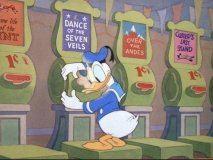
Timber (1941) (8:04)
In an amusing dialogue-less scene near the beginning of this short, Donald reaches into a window where he spots some irresistible food. The man of the house happens to be Pete, and he reasonably gives Donald a chance to work for the food he's stolen. Donald tries every conceivable way to get out of the physical labor, but Pete is especially intimidating and unusually deranged as his nemesis. Even though there's an off-color remark about concentration camps and Pete's got a thick accent, there is surprisingly no Maltin introduction!
Golden Eggs (1941) (7:57)
Upon reading that the price of eggs has drastically risen, Donald goes out to a barn to watch his riches grow. But a rooster won't let him get his hands on the 'golden' eggs. Donald's plan to sneak in and get the eggs involves dressing up as a hen. The rooster really takes a liking to Donald in poultry drag.
A Good Time for a Dime (1941) (7:40)
This short is introduced by some information from Maltin on penny arcades, sexy dances, and forbidden fruit. Donald walks around a penny arcade, and settles on "Dance of the Seven Veils", which he watches Daisy perform in a slideshow. The penny arcade cheats Donald, as does the claw machine, and an aviation machine. Poor Donald!
Early to Bed (1941) (7:50)
Donald tries to get to sleep early, but everything seems to be in the way of that. Especially disruptive is Donald's alarm clock, with which he goes to war in the name of rest. If that isn't enough, he's also got to do battle with a springy bed.
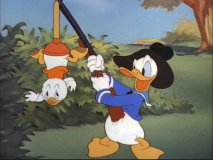 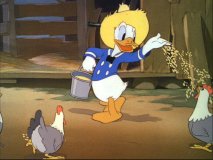 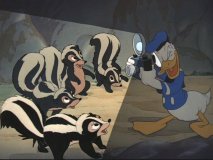
Truant Officer Donald (1941) (7:47)
While Huey, Dewey, and Louie go for a swim, Truant Officer 13, a.k.a. their uncle Donald watches and takes action. But as usual, the nephews outwit the hot-tempered Donald. He tries to get them out of their secret Pirates den back on the straight and narrow path. Donald tries to smoke the evildoers out of their cave. This is a bit dark as far as Donald cartoons go.
Old MacDonald Duck (1941) (7:46)
This lighthearted farm short has Donald feeding the barnyard animals and milking a cow. When a bee gets Donald's rage going, the duck makes use of the cow's udders.
Donald's Camera (1941) (7:45)
This short follows the standard Maltin intro on gunplay and stock gags. Donald sees a sign and vows to shoot animals with a camera and not a gun. But out in the wild, he doesn't have much luck getting any good photographs. A cranky woodpecker proves especially formidable to Donald's efforts. When photography fails him, Donald runs to bear arms.
Chef Donald (1941) (7:30)
Donald follows a radio program's recipe to make waffles. As usual, though, something goes wrong. First, the mix won't separate, and then it takes on a life of its own. At what cost, waffles?!
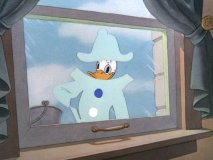 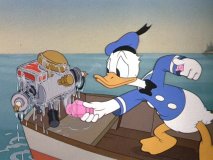 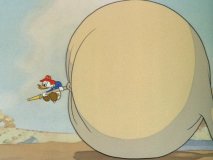
VIDEO & AUDIO
All of the shorts and bonus features on Disc 2 are also presented in 1.33:1 fullscreen. Video quality on these later shorts appeared to be entirely free of the problems that plagued some of the oldest shorts on Disc 1. Colors were accurate and vibrant, and there was no evident artifacts, print flaws, or shimmering. The video was generally sharp and clean.
There is a bit more life to the soundtracks on Disc 2. The Dolby Mono tracks do a fine job of presenting the dialogue, music, and plethora of sound effects with clarity, in spite of the age. There were no noticeable inconsistencies or problems with the audio on these shorts from 1940 and 1941.
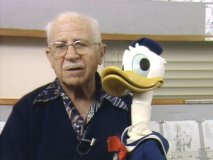 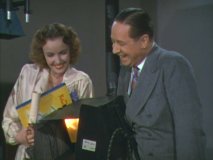 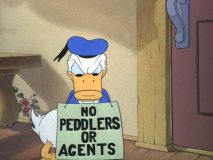
BONUS FEATURES
"The Man Behind the Duck" (5:32) profiles Clarence "Ducky" Nash, who voiced Donald for over fifty years. Nash lucked out and was hired for his unique whistle. Maltin details Nash's career, which in addition to Donald and other duck characters, included roles in Bambi and 101 Dalmatians. Though brief, this featurette contained a good deal of information on the voice actor who is behind all of this DVD's shorts and much more.
Though that was the only listed supplement, there are two Easter eggs in the Bonus Features menu.
Easter Egg: Clip from The Reluctant Dragon (2:15)
In this scene, presented in color, the film's host Robert Benchley learns how cartoons come to life. Donald does just that and explains to Benchley just how.
Easter Egg: The Volunteer Worker (2:40)
In this amusing 1940 short, Donald goes from doorstep to doorstep looking for donations. Each door slams on him, and his efforts are in vein. It's not introduced, so it's not clear why it's included like this, or what exactly it is. But it's a nice bonus, and one in which we get to see Donald sing "Heigh-Ho."
Disc Two's menus match the first disc in their simplicity and elegance. These screens feature a red checkered background, and again, all but the shorts menus are joined by music.
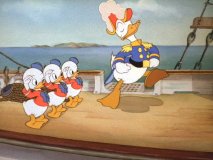 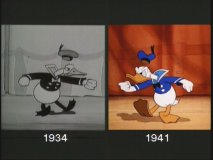 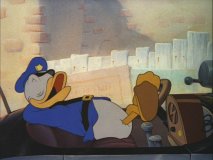
CLOSING THOUGHTS
How much you enjoy this DVD release of The Chronological Donald is solely dependent on how much you enjoy Donald Duck shorts. While it is light on bonus features, it packs more shorts than any other Wave 3 release.
The video and audio quality of some shorts is a bit lesser than that of Walt Disney on the Front Lines and Mickey Mouse in Living Color, Volume 2. The affected cartoons are a bit older, and judging from the effort that goes into these Treasures, I'll give the remastering work the benefit of the doubt. After all, considering the age of the films, the quality is certainly satisfactory. Most of the shorts from 1939 exhibit better video and audio, as well.
The character of the often-irritated Donald Duck is one of animation fans' favorites. There's a definite formula to these shorts, which is why they're more effective in doses rather than all at once. Fans of Donald will be glad to own this collection of shorts, and there are future Donald volumes to rectify the shortage of bonus features.
The shorts here chart Donald's rising popularity around the same time that Disney was experiencing success in the feature film format. Donald supplanted Mickey as the favorite character, and there's a definite charm to these shorts. While Treasures collectors will need no encouragement to pick this set up, for fans of classic animation, it's certainly worth checking out.
More on the DVD / Buy from Amazon.com
 |























